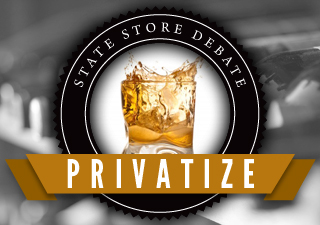Media

Desperate Times, Desperate Claims
UFCW President Wendell Young is so desperate to retain Pennsylvania’s 80-year old government liquor monopoly that he’ll say anything. Most recently, he claimed “privateers” were hacking an online poll of the Pittsburgh Post-Gazette, though online polls have little weight, and scientific polls consistently show voters support liquor store privatization.
Two of the myths Wendell Young has crafted include that the PLCB generates $500 million annually for the state, and that privatization will destroy 3,000 jobs currently held by state liquor store clerks.
Jobs
Ending the state-run monopoly will create thousands of additional jobs across the state and unleash millions of dollars in new business investment. Gov. Corbett’s proposal allows beer distributors to expand their already safe and reliable businesses, creates hundreds of new wine and liquor outlets, and enables grocery stores to expand to sell wine and beer to meet the needs of consumers.
According to the PFM analysis of the governor’s plan, approximately 6,000 current stores would buy licenses to sell wine and beer, in additional to the 1,200 new stores that would purchase wine and spirits licenses.
|
New Liquor Licenses under Privatization |
|
|
Wine and Spirits Stores |
1,200 |
|
Beer/Wine Licenses |
|
|
Big Box |
100 |
|
Grocery |
2,400 |
|
Convenience |
800 |
|
Pharmacy |
1,700 |
|
Enhanced Beer Distributors |
1,000 |
|
Total New Stores |
1,200 |
|
Total Expanding Stores |
6,000 |
|
Liquor Modernization Analysis Based on Governor Corbett’s 2013 Proposal, Pennsylvania Office of the Budget, Conducted by the PFM Group, January 2013, http://www.governor.state.pa.us/ |
|
Young likes to cite a 2011 PFM analysis which says additional jobs at current stores would be “minimal.” But even “minimal” new jobs at 6,000 existing stores plus full staffing at 1,200 new wine and spirits stores would result in tens of thousands of additional jobs across the state, just in retail stores.
Moreover the plan would bring millions back into Pennsylvania through a reduction in border bleed. The PFM group estimates $92 million in additional sales would return to Pennsylvania via cross-border sales in the most populous areas. More sales means more revenue for the state, more jobs for residents, and more opportunity for business owners.
Revenues
The claim that PLCB generates $500 million in “profits” for the state is misleading at best.
Approximately 80 percent of the “profits” the PLCB transfers to the state was generated from taxes, and the rest is taken out of the pockets of Pennsylvania consumers and taxpayers through “markup” charges. Privately-owned liquor stores would produce the same revenue or more, as private companies pay additional taxes and licensing fees to the state.
The PFM analysis of Governor Corbett’s proposal estimates that privatization would generate more for the state in 2014 than under the government monopoly.
|
PLCB Annual Revenue and Expenditures |
||
|
LCB Program Revenue |
Current (2014) |
Privatization |
|
LCB Markup |
$556,000 |
$0 |
|
License Fees and Fines |
$13,000 |
$138,250 |
|
Misc Income |
$3,000 |
$0 |
|
Retail Regulatory Fee |
$0 |
$20,000 |
|
Total Program Revenue |
$572,000 |
$158,250 |
|
|
||
|
Expenses |
||
|
LCB Operations |
$438,000 |
$35,000 |
|
State Police Enforcement |
$22,000 |
$27,000 |
|
Treatment and Prevention |
$2,000 |
$3,520 |
|
General Fund Transfer |
$80,000 |
$80,000 |
|
Total Expenses |
$542,000 |
$145,520 |
|
|
||
|
Net Revenue |
$30,000 |
$12,730 |
|
|
||
|
Taxes |
||
|
Johnstown Flood Tax |
$323,000 |
$335,000 |
|
State Sales tax |
$127,000 |
$132,000 |
|
Corporate Income Tax |
$0 |
$1,900 |
|
Personal Income Tax (on S-Corps) |
$0 |
$500 |
|
Total Taxes |
$450,000 |
$469,400 |
|
|
||
|
Total Revenue for General Fund, State Police, and Treatment |
$584,000 |
$592,650 |
|
Liquor Modernization Analysis Based on Governor Corbett’s 2013 Proposal, Pennsylvania Office of the Budget, Conducted by the PFM Group, January 2013, http://www.governor.state.pa.us/ |
||
Stay tuned for more liquor store privatization facts and myths, and check out our new issue-specific website, BoozeFacts.com.